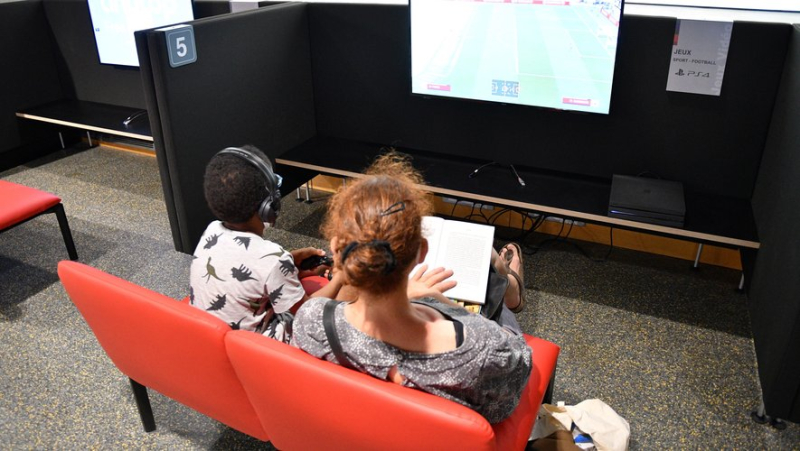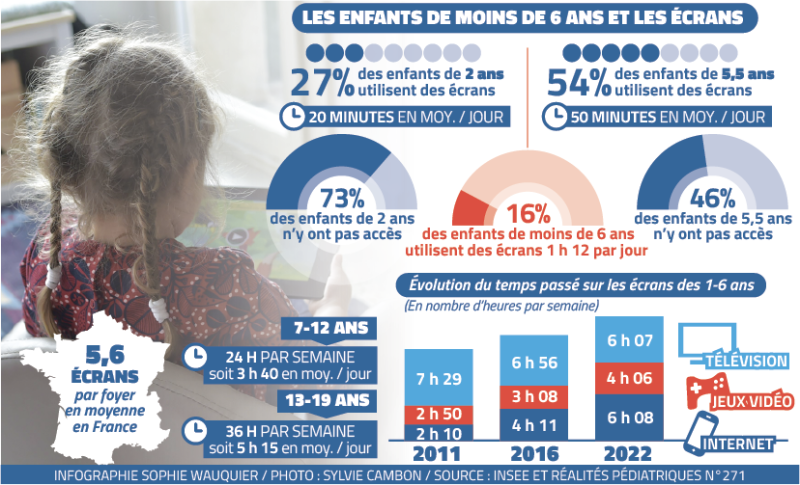“We must stop demonizing screens”: in Montpellier, doctors explain why they are also useful for children

Problematic, the use of screens ? Midi Libre – JEAN-MICHEL MART
At the age of 5, one in two children uses a screen. From the age of 13, he spends on average more than 5 hours a day there. Worrying ? This Friday, March 29, in Montpellier, a medical congress devotes a day to the subject, which has become a state affair: in January, Emmanuel Macron set up a group experts who were to submit a report to the president before the end of March. Here we are.
"Doctor, he's glued to the screens all day, it's serious ?" Not a day goes by without Olivier Revol, child psychiatrist at Lyon University Hospital, is not questioned by a parent. He puts things into perspective from the outset: "There are few real addictions. We learn to tell the difference between a "geek" and a "no life". The first thing to do is demonize".
With his colleague Nathalie Franc, child psychiatrist at Montpellier University Hospital, the doctor intervenes on this "passionate subject", in closing of the physical medicine and rehabilitation congress opening this Wednesday in Montpellier.

Impact of screens on language in toddlers, cognitive development, psychological risks, dependence, excessive behavior in adolescence… experts from Montpellier, Lyon, and Rennes, Grenoble, Marseille… will come to debate on the subject this Friday, March 29, before submitting their thoughts to the general public, in a conference open to all, upon registration.
The subject has become a matter of state: last January, the President of the Republic, wishing to regulate the access of minors to telephones, tablets and game consoles , announced the creation of a group of experts on the subject. He was due to submit his report at the end of March.
"The question is much more complex than we imagine"
"The question is much more complex than we imagine, and the deeper we dig, the more complex it is. The problem of screens alone is not a reason for consultation, but it comes up in all child psychiatry consultations… hellip; even the definition of an addiction to screens is not the subject of a consensus", recalls Claire Jourdan, hospital practitioner in the department of physical medicine and rehabilitation at Montpellier University Hospital.
"You know Minecraft ? It’s a great game, and it’s not the only one. Manage impulsivity, accept failure, work on visio-spatial skills…hellip; there are plenty of positive things in screens", argues Olivier Revol, who sees the equivalent, for "small urban dwellers& ;quot;, from "the cabin at the bottom of the garden of our childhood".

Pediatrician neurologist Pierre Meyer, from Montpellier University Hospital, is one of those who hunt for "false beliefs"& ;nbsp;: "No, IQ does not drop and it’s not the fault of the screens, it even tends to increase", insists the doctor, who deplores "unreliable studies on the subject".
"International data with hundreds of thousands of patients perhaps show a slight impact of screens on cognition, but the effects are positive from when we talk about educational programs, co-viewing with parents, and this is also the case for video games, affirms the doctor, who also relies on data from the Elfe cohort: "At the age of 3 and a half, one in two children is exposed to an hour of screen time every day. Dogmatic messages do not work, we are in a digital society. But we have also observed that television turned on during meals has a negative impact on the language of young children, at the age of two.
His conclusion: "We need to be interested in the real subjects, the type of screen we are talking about, the content, and finally talk about technoference", the relationship to the screens of adults who surround the child, and who interfere in the parent/child relationship.
A conference for the general public, a book
"Addicted to screens, it’s serious doctor ?" This is the theme of the free general public conference organized at the Corum in Montpellier with Nathalie Franc and Olivier Revol, child psychiatrists at the Montpellier and Lyon University Hospitals. From 5:45 p.m. to 7:30 p.m., Einstein room at the Corum in Montpellier.
Registration is required on the website www.empr.fr
The reflections of the experts participating in the congress are also the subject of a book, "Screens and learning, the brains of our children facing the challenges of digital technology& quot;, published by Sauramps medical. 30 euros.
"The most difficult thing for parents to manage on a daily basis"
"When, during the consultation, the adult’s phone sends dozens of notifications, I wonder", concedes Nathalie Franc, who confirms that the question of screens "is not a problematic subject in itself" for a doctor. But yes, "this is the most difficult question for parents to deal with on a daily basis". "It’is a subject of major conflict, and it can mask another problem", adds Olivier Revol.
Because parents tend to "everything" blame screens: "When we take things up in consultation, we see other problems arise. If a teenager doesn't let go of their screen, it may be because they are depressed, or because they have a school phobia…hellip; If he doesn’t have any friends, it’s not because of the screens either. And once and for all, screens do not cause autism and it is not because of video games that there is more violence. s’annoys Nathalie Franc.
And so on. "Putting the little one in front of a screen" becomes a problem, however,"when it takes the place of things that could have been done instead". As long as it is "paint or modeling clay".

How to find your way ? "Today’s parents did not grow up with screens, it’s difficult to be relevant. The codes have changed", underlines Olivier Revol, who advises acting "with tact and moderation". Even if it means revisiting the rule "3, 6, 9, 12" (no screen before three years, no personal games console before 6 years, no accompanied internet before 9 years, no internet alone before 12 years), from psychology doctor Serge Tisseron& ;nbsp;: "I'm not sure it's still suitable".
"For me, this is no longer relevant. But cutting screens is never trivial and it’s not realistic. The world of 2024 is connected, indicates Nathalie Franc.
"You have to learn to set limits"
"You need a framework, you have to learn to set limits", adds Olivier Revol. For him: "No console during the week, no screen in the evening, not to annoy them but because the blue light activates the secretion of melatonin which makes the brain think that it is broad daylight" ;.
"Take an interest in the content of the screens, favor those that are educational, make it a time to share with the child, put in controls parental ", adds Nathalie Franc who does not recommend the screen before the age of 3 "except for a video in family". Also, "no screen in the little child's room", and "more freedom for pre-adolescents and adolescents. At the risk of exposing them in the event of excessive rigidity:"I think of a teenager whose parents had banned social networks. She had created a Snapchat account, she had been harassed, she couldn't talk to them about it.
"No screen before school, no screen at lunch and bedtime, no screen in the room", advises Pierre Meyer, aware that "everyone is reassured when a word is given", who has developed the habit of '"systematically questioning his patients in consultation, as we talk about sleep time or the practice of a sporting activity".
And it works: "I encounter no reluctance, no hostile demonstrations, just questions. Families are amazed: "Ah well, you shouldn't consult a screen before going to class ?" No, it's not possible to do 8 to 13 hours of screen time per day, what's left for school? … Yes, that exists too.
I subscribe to read more




